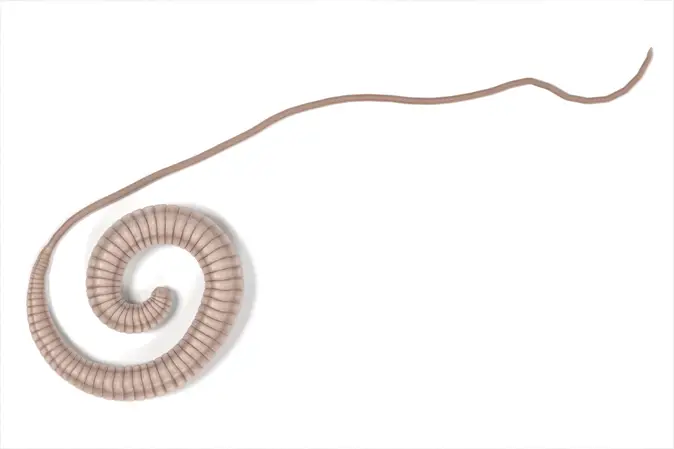Whipworms in Dogs
14.04.2021.
One of the worst things to think about is dog parasites. That is why many dog owners skip learning about symptoms and parasite prevention. Most of us tend to learn about parasites like whipworms only when our vets suspect our dogs might be infected. If you want to know more about whipworms in dogs, read on and learn about the symptoms, prevention, and treatment for whipworms.
What are whipworms?
Whipworms are intestinal parasites that can infect our dogs. They are not the only intestinal parasites; there are others like tapeworms or hookworms. Whipworms are tiny parasites that only reach the length of ¼ of an inch. They live in the cecum (a small pouch at the front of the large intestine) and the dog’s large intestine.
These nasty parasites will attach themselves to the lining of the dog’s intestine and cause all sorts of health issues. Out of all parasites that can infect our dog’s intestines, whipworms will cause the most diseases.
Life cycle
To fully understand how to help your dog get rid of or prevent whipworm infestation, it is a good idea to learn about the whipworm’s life stages. Different life stages might require different treatment. Whipworms have three life stages; egg, larvae, and adult. The adult whipworm that already infected a host will lay eggs and let them loose in the dog’s digestive system.
The eggs will get expelled with the feces, where they will mature to a stage where they will be ready to infect other hosts. When the whipworm eggs get ingested, they will hatch in their new host. They will mature and attach themselves to the large intestine’s mucosal lining, where they will continue the whipworm life cycles.
Another dangerous parasite that can infect our dogs is heartworm. Check out this article for more information - Heartworms in dogs.
Whipworm infection symptoms
Whipworms can cause all sorts of health issues for dogs, especially if they infect the dog in large numbers. It is crucial to spot the symptoms of whipworm infection as soon as possible and start the treatment. However, that might be a bit tricky.

Some dogs might not show any symptoms at the early stages of whipworm infection. However, over time, the whipworms will cause issues in the cecum and the colon. The dog will start exhibiting symptoms. The most common symptoms of whipworms in dogs are;
- Lethargy
- Bloody feces
- Weight loss
- Diarrhea
- Anemia
These symptoms can point to all sorts of different diseases, infections, and conditions. Make sure you contact your vet as soon as you notice anything weird going on with your dog. Whatever the cause of these symptoms might be, you’ll want to know sooner than later.
How can dogs get whipworms?
Whipworms are very resistant, and they can survive in the environment for up to 5 years. Whipworm eggs will be present in the infected dog’s feces which can contaminate the ground around it. The healthy dog can sniff the poo or walk on the contaminated soil and lick their paws afterward. That is the most common way dogs get infected with whipworms.
There are other parasites that can infect your dogs, and one of them is Giardia. Check out this article for more information - Giardia in dogs.
How are whipworms detected and diagnosed?
Like many other intestinal parasites, whipworms are detected by examining the dog’s stool sample. However, the dog can exhibit symptoms of a whipworm infection, and the results of the stool examination can be negative. The female whipworms require 10 - 12 weeks to start laying eggs, and they lay them fairly inconsistently. It is quite possible for dogs to be infected, but the stool sample shows negative results.
Luckily, vets are very well aware of that issues, so they made it the usual practice to treat dogs with large intestine diarrheas with whipworm dewormers. If the reaction to the treatment is positive, that means whipworms were present in the dog’s body.
How are whipworms treated?
If your dog gets infected with whipworms, you will most likely need some veterinary help. Luckily, many medications can help you clear your dog’s whipworm infection. Drugs like fenbendazole, milbemycin, febantel, oxantel, and moxidectin are pretty effective.
However, whipworms are resilient, and the chances of reinfection are pretty high. Besides treating your dog with medication, you should make sure the environment your dog was living in is parasite-free. The best way to destroy whipworms in the soil is to use agricultural lime made from limestone or chalk. However, make sure your dog doesn’t ingest it accidentally. Keep your dog’s kennel and bedding clean, and clear all the puddles that might be around their living areas.
One of the popular dog deworming medicine is Panacur. Check out this article for more information - Panacur for dogs.
Can whipworms be prevented?
Yes, whipworms in dogs can be prevented. The critical thing is to listen to your vet and make sure your dog is regularly dewormed. Some heartworm dewormers are effective against whipworms as well. There are different chewable tablets and other dog dewormers that will make sure you and your dog don’t fear parasite infestations.
If you are not sure what dog dewormers are effective against whipworms, check out this article for some suggestions - Best dog dewormers.
Can I get infected with dog whipworms?
Humans are not at risk of getting infected with dog whipworms. We have our own species of whipworms that can infect humans. Luckily, human whipworms are very rare. The best way to make sure you don’t get infected by whipworms is to practice good hygiene. It is often enough to wash your hands to get rid of most bacteria, viruses, and parasites you might have picked up.
World Dog Finder team







Share